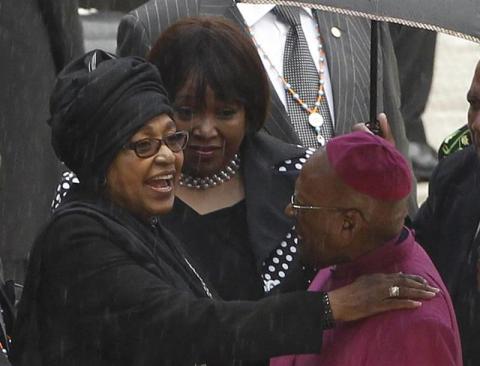Advertisement
South Africa's Tutu Not Attending Mandela Funeral, Says Not Invited
CAPE TOWN (Reuters) - South Africa's retired Archbishop Desmond Tutu will not attend the funeral on Sunday of friend and fellow anti-apartheid hero Nelson Mandela because he did not receive a formal invitation and did not want to "gatecrash," he said on Saturday.
Government officials insisted he was on the guest list.
But the Anglican prelate's office said in a statement he had canceled plans to travel to the Eastern Cape province for the funeral "after receiving no indication that his name was on a guest or accreditation list".
Mandela, South Africa's first black president who died last week aged 95, had a close friendship with fellow Nobel Peace Prize laureate Tutu, forged in the struggle against apartheid.
Tutu's absence from the global icon's final farewell raised questions about the outspoken clergyman's strained relationship with the current South African government and ruling ANC party.
"Had I or my office been informed that I would be welcome there is no way on earth that I would have missed it," Tutu said in the statement.
"Much as I would have loved to attend the service to say a final farewell to someone I loved and treasured, it would have been disrespectful to Tata to gatecrash what was billed as a private family funeral," he said, using the affectionate term 'Tata' for Mandela, meaning father in Xhosa.
Asked about Tutu's non-attendance, foreign ministry spokesman Clayson Monyela earlier told Reuters: "Desmond Tutu is definitely on the guest list".
"I suspect the issue here is whether he would have provided any official duties as a clergy person ... he may have taken a decision not to attend the funeral," he added.
The controversy emerged as Mandela's body arrived at his ancestral home of Qunu ahead of the state funeral, which will be attended by family members, national leaders and foreign guests including Britain's Prince Charles and U.S. civil rights activist Reverend Jessie Jackson.
At a mass memorial ceremony for Mandela on Tuesday in Johannesburg, Tutu was not initially on the speaker's list but he was eventually invited to the podium and tried to calm an unruly crowd that had booed President Jacob Zuma.
In his autobiography 'Long Walk to Freedom,' Mandela warmly described Tutu as "a man who had inspired an entire nation with his words and his courage, who had revived the people's hope during the darkest of times."
Since the end of apartheid in 1994, Tutu, 82, has become a fierce critic of the ruling Africa National Congress (ANC), accusing it of losing its way and straying from the ideal of a "Rainbow Nation" of shared prosperity that he and Mandela had envisaged.
Tutu has criticised Zuma's leadership and in 2004, under then President Thabo Mbeki, he accused the ANC of promoting "kowtowing" and said its black economic empowerment (BEE) policies were helping only a small elite.
Mbeki gave a scathing response, saying Tutu's comments on economic empowerment were "entirely false" and accusing him of "empty rhetoric".
Tutu remains one of the country's leading moral lights and chaired the Truth and Reconciliation Commission, the body set up after the end of apartheid to examine human rights abuses.



















Add new comment